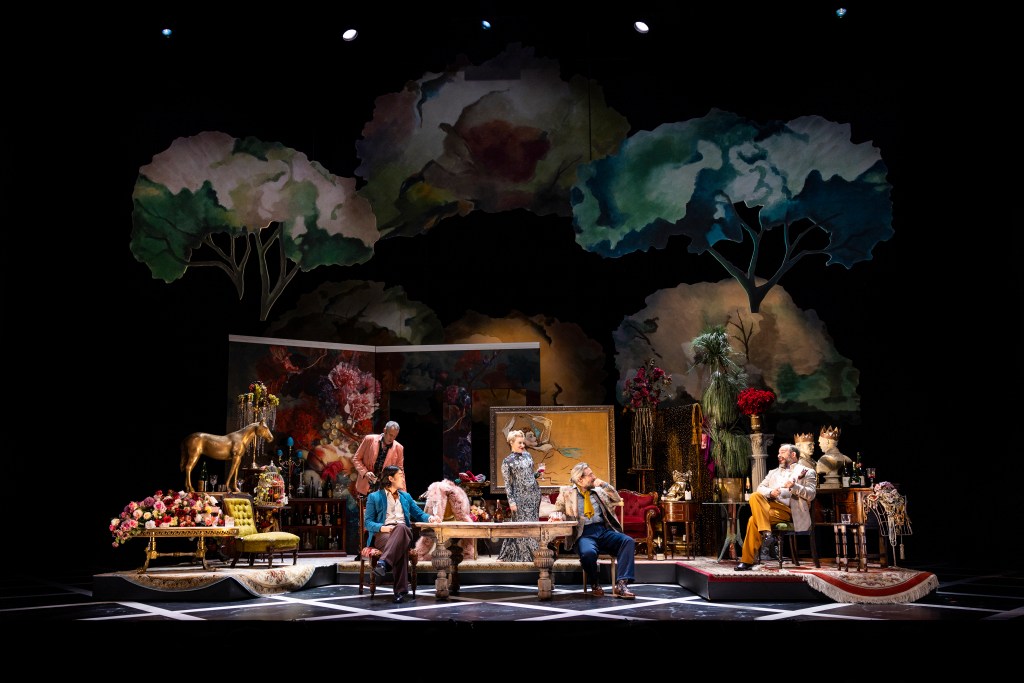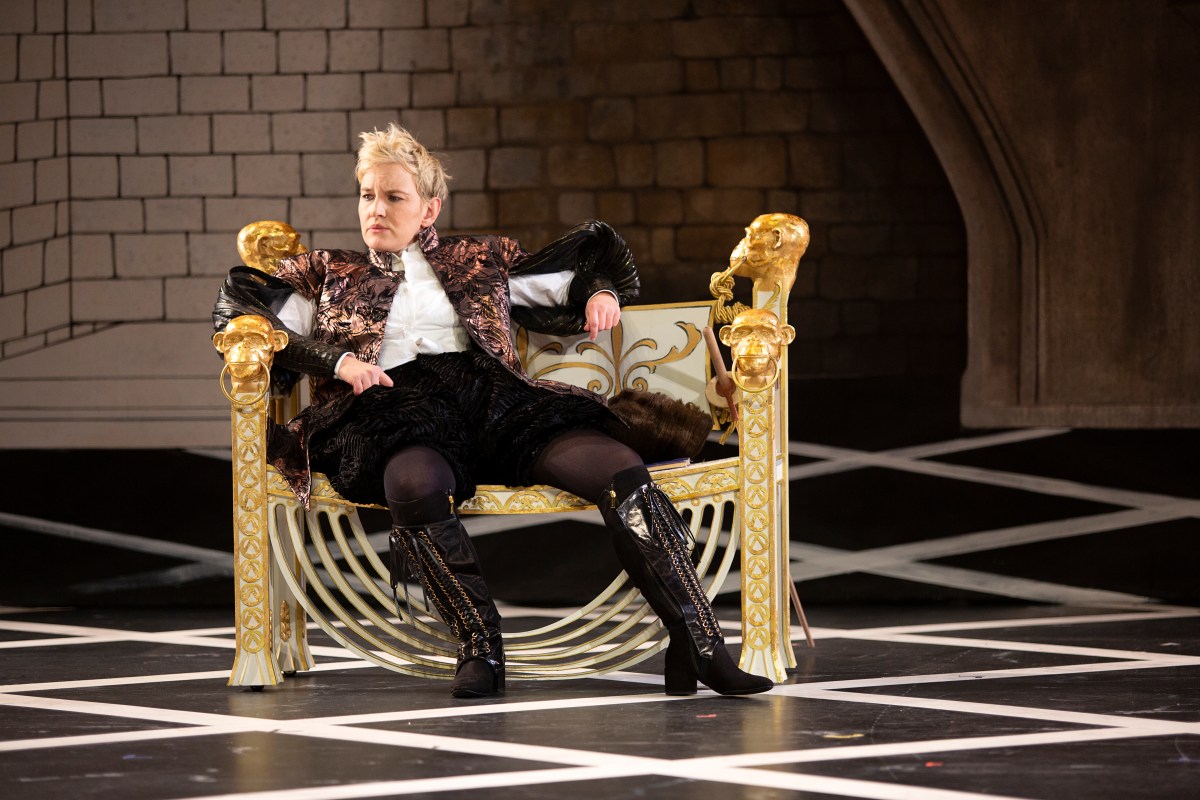‘Oh what a rogue and peasant slave am I’ – the play begins. Sarah Bernhardt is costumed in Shakespearean-ish puffy pants and gold vest, a comical first season Black Adder-esque wig on her head – physicalising a formalistic pose of woe in front of a painted set. She struggles with her lines; she calls for her cue. She can’t for the life of her find the essence of what Hamlet means when he calls the player ‘monstrous’.
It’s 1899. The great actress Sarah Bernhardt is no longer young, she runs her own theatre company and has decided to put on Hamlet and play the Prince of Denmark himself. Why? Well, lots of reasons, and the play, written by extensively Broadway-produced US writer Theresa Rebeck, explores – through brilliantly witty scenes charged with drama – what fuels her obsession.
What is it, after all, about the role of Hamlet that compels us? And what is it about playing the role that attracts Bernhardt? And why does she struggle with it so much? Is it an act of ego? ‘All theatre is an act of ego,’ Bernhardt retorts.
Everyone has an opinion on Bernhardt tackling the role. Her critics, represented by Louis (performed with admirable critic-like cocksurety by John Leary), think it ridiculous, an abomination. ‘Looking at a woman, is fundamentally different to looking at a man,’ Louis says. Bernhardt is aghast – ‘why?’ she demands, staring him down.
She is supported by her company – Constant Coquelin (performed by seasoned, masterful actor Marco Chiappi) thinks she can do it, but he is on her payroll. No longer of an age to play Hamlet himself, he’s now her Polonius and the ghost of her dead father, the former king – a role where at least he can sleep afterwards. If you’re Hamlet, he says knowingly, having played the part four previous times (‘but never in Paris’), you never sleep.
In the same way that novels about books often strike a chord with readers, theatre about the art of theatre, done well, is catnip for theatre-lovers. The play-within-a-play has been a convention since the birth of theatre itself. But is Bernhardt/Hamlet good? In short: youbettcha.
Personally, it’s the sort of theatre I yearn for. At the heart of it is great writing that never forgets that drama is what propels scenes forward, acting that makes you want to weep it’s so good, an optimal mix of sparky wit and heartrendingly real moments of truth and pathos, and all the elements of set, scene, sound, fitting together as if they were conjured up in a joyous magical melting pot. Bubble bubble, and all that.
Kate Mulvany OAM as Bernhardt playing Hamlet is no stranger to the iconic male roles of Shakespeare – her performance of Richard Duke of Gloucester in Bell Shakespeare’s Richard III won her a Helpmann Award in 2017. She is simply brilliant as the protagonist.
Bernhardt’s character in Bernhardt/Hamlet is so complex: she’s powerful, strong, vulnerable, full of doubt, sensual, hyper-ambitious – sometimes all at once – and Mulvany fully inhabits her. Every actor in the country – and anyone that aches to see truly great acting – should make it an immediate priority to go and see her in it. There are oceans of knowledge and insight and understanding of the human condition that can be gleaned as we witness every nuance of the struggle: as Bernhardt taking on the role of Hamlet, and through every peak and trough of Bernhardt’s sexually-charged creative and romantic relationship with Edmond Rostand (a convincing lovesick bohemian, Charles Wu) – the married writer with whom she has a relationship.
There is so much work behind this kind of acting – but like a glorious swan or a bloody-footed ballerina wrapped up en pointe – we don’t see the hours of labour, just the seemingly effortless, totally real and miraculous performance.
Bernhardt/Hamlet is MTC artistic director Anne-Louise Sarks’ third programmed play under her leadership and she is just continuing to nail it. She also directs – and it’s a work of sheer theatrical beauty.

Rhythmically spot on, each actor hits the right beats, clicking with the cadence of the play’s language – a scene in the second act between Bernhardt’s love interest Rostand and the painter that helped cultivate her celebrity status, Alphonse Mucha (Tim Walter), where they discuss the pros and cons of Rostand’s task (given to him by Bernhardt) to write a new script for Hamlet, stripping it of all lyrical language and iambic pentameter, is a rhythmic delight. I wanted to tap my foot to the lyrical poetic metre of the scene, in a beautiful showing-while-telling moment.
The second act introduces us to a more assured Bernhardt – she is finding her moments with Hamlet. Her frustration in finding the truth of Hamlet’s intent leads to an improvised scene with Coquelin, playing her father’s ghost, resulting in a lightning bolt moment of insight – it’s breathtaking. As she says, playing Hamlet is the closest anyone can get to understanding Shakespeare himself: it’s worth the work involved, the actorly existential angst – despite Hamlet being useless and indecisive, a privilege not afforded to women. ‘When women do nothing, they are nothing; when men do nothing, they’re Hamlet’, she says bitterly.
Bernhardt’s son, Maurice, performed with delightfully louche charm by William McKenna, thinks she’s being rash in taking on the role – she’s broke, after all, and both their bills need to be paid. There are some really fun scenes between the two, as we see another side of Bernhardt-as-mother – her love for him clear in their playful exchanges, but she is no sandwich-making soccer mum. She is, first and foremost, an artist.
The set and costumes by designer Marg Horwell are strong, featuring a mix of large props and painted scenery – each their own masterful work of water-coloured art – for Bernhardt’s theatre-world, and more discreet roll-on set rooms for specific scenes: a timber-walled café/bar or dressing room with velvet chaise longue.
In the second act, additional sections of set roll in, from the wings and back of the theatre, combining to expand Bernhardt’s dressing room, transforming it into an extravagant shrine of fin de siècle celeb excess. An ornate dining table is at the centre, set with wine-coloured upholstered chairs. It is elaborately decorated, expressing sensuous and carnal tastes – we see a large picture of Bernhardt herself in recline adorning the back wall, a gold horse, golden skulls, furniture dripping with strings of crystals, vases of emu feathers, cascading brightly-hued arrangements of flowers – Bernhardt is holding court, gleaming like a diamond in a delicious Art Nouveau-inspired printed gown adorned with crystals. It’s a feast for the senses.
There is a change that comes in the second act – and it’s a beauty. I won’t say too much, but it allows us to see a whole new side of Bernhardt’s power and tragedy – revered as celebrity, but never understood. You could have heard a pin drop when it came.
I saw Bernhardt/Hamlet at its media opening, on International Women’s Day – and it does feel like this play, at this moment in time, is a clarion call.
Read: Book review: Dress Rehearsals, Madison Godfrey
Bernhardt says in the final act: ‘I have never wanted to play the flower. Playing the ingenue is beneath me. It’s beneath all women.’ We have such mind-blowingly talented women actors, directors, writers – although it’s such a common thing to hear that roles for women dry up after they are 40 – and the ones that have been traditionally written for us, relegate us to the roles of Madonna or whore, ingenue or crone.
But, with a strong woman at the head of Victoria’s state theatre company, clearly championing women’s stories of all ages, diverse stories – it feels like a change is coming. Sarah Bernhardt, I can only imagine, would be proud.
Bernhardt/Hamlet by Teresa Rebeck
Melbourne Theatre Company
Director: Anne-Louise Sarks
Set and costume designer: Marg Horwell
Lighting designer: Amelia Lever-Davidson
Composer and sound designer: Joe Paradise Lui
Fight and movement director: Nigel Poulton
Voice and text coach: Geraldine Cook-Dafner and Amy Hume
Associate set designer: Jacob Battista
Costume Associate: Sophie Woodward
Assistant Director: Tasnim Hossain
Intimacy coordinator: Amy Cater
Assistant to the fight director: Tom Royce-Hampton
Fight captain: Tim Walter
Assistant fight captain: John Leary
Stage manager: Whitney McNamara
Deputy stage manager: Meg Richardson
Assistant stage manager: Finlay Pedler
Stage management intern (VCA): Liz Bird
Rehearsal photographer: Charlie Kinross
Rehearsal and production photographer: Pia Johnson
Marketing campaign photographer: Jo Duck
Cast: Marco Chiappi, Tahlee Fereday, John Leary, William McKenna, Kate Mulvany, Dushan Philips, Sahil Saluja, Tim Walter, Charles Wu, Izabella Yena
Bernhardt/Hamlet will be performed until 15 April 2023.





